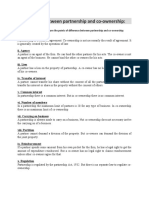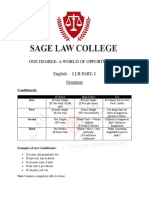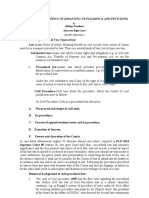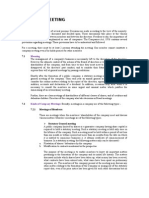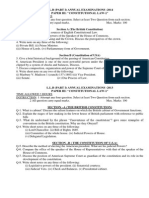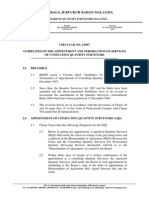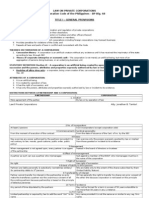CHAPTER 3
TYPES OF COMPANIES
�RECAP
LECTURE 2
In previous lecture we have covered the following topics
Jurisdiction of the courts
Company Benches
Procedure of the court
Appeal against court orders
SECP (Security and Exchange Commission of
Pakistan)
Registrar
�COMPANY
What is a Company
Company ordinarily means an association of a number of
individuals formed for some common purpose .
When a company is registered, it is clothed with a legal personality
and has the same rights and powers as a human being has.
Its existence is distinct and separate from that of its members.
The members may die or change but the company goes on till it is
wound up on the grounds mentioned in the ordinance .
Thus a company is an artificial person .
It can act only through some human agency called the board of
directors.
They control and administer the affairs of the company and act as
its agent.
But they are not the agent of members of the company.
�COMPANY
Definition Of a Company
A company is an association of persons united fro a
common purpose
-Justice James
A company is an association of many persons who
contribute money or moneys worth to a common
stock and employs it in some trade or business, and
who share the profit and loss (as the case may be)
arising there from.
-James Stephenson
�COMPANY
Definition Of a Company In Companies
Ordinance 1984:
A company is an association of persons
registered under the law
having a distinctive name,
recognized as a separate legal entity,
with a common capital contributed by its members
comprising transferable shares of a fixed
denomination,
carrying limited liability and
having a continuous existence and a common seal.
�FEATURES OF A COMPANY
CHARACTERISTIC FEATURES OF A COMPANY
The various definitions quoted reflect the following
characteristic features that a company has:
Artificial person created by law
A company under the existing corporate law is an artificial legal
person
having an entity and personality distinct from the members of
shareholders constituting it.
A company is a legal person because in law it is capable of
having legal rights and obligations just like a natural person.
Like every other human being it can acquire and own property,
transfer property, enter into contracts and sue and be sued in
its own name.
�FEATURES OF A COMPANY
Independent legal entity
Since a company is an entity separate from its
members hence all assets and liabilities in a
business are its own.
No member can claim any ownership rights in it
during its existence or winding up.
This was first recognized judicially in the case of Salomon
vs. Salomon and company Ltd. In which the House of Lords
held that the company was a body corporate distinct from
its members
�FEATURES OF A COMPANY
Perpetual succession
A company has a continued existence and its life is not
affected by
the death, lunacy, insolvency or retirement of its members.
Members may come and go but the company continues its
operations as long as requirements of law are fulfilled.
Common seal
A company must have a common seal for use as an emblem
(logo, insignia) in all legal documents.
The common seal is used as a device as the signature of the
company.
Any document bearing common seal of the company and duly signed
by at least two directors will be legally binding on the company
�FEATURES OF A COMPANY
Limited liability
Here the word liability refers to the liability of the shareholders
towards the company.
This is limited to the value of the shares subscribed to or the amount of
guarantee given by them.
Separate ownership and management
Being in a large number it is not advisable for the shareholders
to run and manage the company.
Hence the law provides for the board of directors, elected by the members
at their general meeting to govern the affairs of the company
�TYPES OF COMPANIES
Registered
Companies
companies limited
by guarantee
Companies limited
by shares
Having
share
capital
Private company
Single
member
company
Not having
share capital
Public company
Other then Listed
single
company
member
company
Unlisted
company
Unlimited
companies
�TYPES OF COMPANIES
Registered Company
Registered companies are those companies which are
registered in Pakistan under the Companies Ordinance,1984
or any previous companies act or ordinance.
These companies are further classified into following
three broad classifications.[15(2)]
Company limited by shares
Company limited by guarantee
Unlimited company
�TYPES OF COMPANIES
Company Limited by Shares:
It means a company memorandum of association limits the
liabilities of its members to the amount unpaid, if any, on
the shares held by them in the capital of the company.
It is the most popular and important among the registered
companies
It is a company which keeps the liability of its members
limited up to the value of the shares purchased by them
It is essential for such companies to use the word Limited at
the end of their names so that the people know the liability
of its members is limited
Most of the industrial and commercial companies in Pakistan are
registered as companies limited by shares.
�TYPES OF COMPANIES
Company Limited by Guarantee:
It means a company whose memorandum of
association limits the
liabilities of its members to the amount as the
members may respectively undertake to contribute
to the assets of the company in the event of its
winding up.
This company may or may not have a share capital.
In Pakistan company limited by guarantee use the
words (guarantee) Limited as the last words of
their names
�TYPES OF COMPANIES
Unlimited Company:
It is a company which is registered
without limiting the liability of its members to
the extent of value of the shares held by
them.
In other words, in case if such companies
there is no limit of liability of members to
contribute the assets on a winding up.
Now-a-days such type of companies are not
found in Pakistan.
�On The Basis Of Articles Of
Association
By virtue of provisions of articles, companies can
further be divided into the following categories
Private Company
Section 2(1)(28) defines a private limited company as
a
company which by its articles:
A. Restrict the rights to transfer its shares, If any;
B. Limits the maximum number of its members to fifty;
and
C. Prohibits any invitation to the public to subscribe for
the shares or debentures of the company
�Public Company
It
It
a.
b.
is a company which is not a private company.
is a company which does not :
limits the maximum numbers of its members;
Restrict the right to transfer its shares, if any;
and
c. Prohibit from inviting public to subscribe for
the shares or debentures of the company.
A public limited company can be formed
with at least
3 members.
�Difference between private and public
company:
P u b lic com p an y
1.
A public company should have at least three (3) members in
case of unlisted
And (7) members in case of listed company.
2.
There is no restriction on the maximum no of members
3.
A public company can invite subscription from general public
4.
A public company can transfer its shares with out any
restriction
5.
A public company has to seek certificate for commencement
of business
P rivate com p an y
6.
A private company should have at least two (2) members
except single member company (SMC)
�Public Company
6.
The public company has to raise minimum subscription before obtaining certificate
for commencement of business.
7.
A public company is required to file the prospectus or a statement in lieu of
prospectus (SILOP) for obtaining the certificate for commencement of business
8.
A public company is required to file its accounts with the registrar and also with the
commission if it is listed.
9.
Auditors qualification is presented as chartered accountants.
10. A public company should have at least three (3)directors in case of unlisted company
and seven (7)directors in case of unlisted.
Private Company
11. There is no requirement to raise minimum subscription.
12. There is no requirement of filing prospectus or statement in lieu of prospectus for a
private company except when private company converts into public company
13. Filing of accounts is not required by the private company if its paid up capital is less
than 7.5 million rupees
14. No qualification is prescribed for an auditor of a private company except when it has
a paid up capital exceeding RS 3million.
15. A private company should have least two (2)directors except single member
company (SMC).
�Public limited companies may further
be classified in two categories.
Listed Companies:
The companies whose securities are allowed to
be treated on a stock exchange are called listed
companies.
Un-Listed Companies:
The companies whose securities are not allowed
to be treated on a stock exchange are called unlisted companies.
�On the basis of company of shareholding:
On the basis of composition of share holding ,companies can be
classified in any of the following types
Holding company[section 3]:
It means a company or body which holds directly or in
directly more than fifty percent (50%)in the voting securities
of a company ,or has a power to elect and appoint more than
fifty percent (50%)of the directors of such other company
Subsidiary company[section 3] :
It means a company or a body corporate whose more than
fifty percent (50%) voting securities are held or controlled
directly or indirectly ,by some other company or such other
company has a power to elect and appoint more than fifty
percent of directors of such company
�Associated companies [section 2(1)
(2)]:
A company whose 20% or more shares
(upto50%) are held by another company
shall be considered an associated
company of that company (for complete
definition of an association company )
�Associations not for profit [section 42]:
If the securities and exchange commission of
Pakistan is satisfied with an association which has
been formed or is capable of being formed as a
limited company that it meets the conditions
specified by companies ordinance 1984 ,the
companies may grant a License and direct that the
association be registered as a limited company with
out the addition of word limited,(private ) limited
or (guarantee) limited as the case may be, to its
name and the association may be registered
accordingly
�5.2 conditions specified by companies
ordinance,1984
a. Association should be formed for providing
commerce art, science, religion, sports, social
services, charity or any other useful object;
b. Association applies or intends to apply its profits, if
any or other income in promoting its objects; and
c. Association prohibits the payment of dividends to
its members.
5.3 The conditions and regulations in this regard issued
or imposed by the commission shall be binding on the
association and may be inserted in memorandum and
articles of association or in one of those documents on
the direction of commission.
�5.4 The association shall enjoy all privileges of a
limited company and be subject to all its obligations
except using the word Limited, (Private) Limited
or (Guarantee) Limited, as the case may be, as
part of its name.
5.5 The license may be revoked by securities and
exchange commission of Pakistan and upon its
revocation, the register shall enter the word
Limited, (Private) Limited or (Guarantee)
Limited, as the case may be, at the end of the name
of Association and Association will cease to enjoy all
the exemptions and privileges granted by SECP.
�5.6
before the revocation of license, the commission
shall give a notice in writing to association of its
intention and the association shall be afforded the
opportunity of submitting a representation in this
regard
5.7 the companies rules 1985 states that the above
privileges are available to public limited companies
only and no private limited company can be granted
license under section 42.
�TYPES OF COMPANIES
BY VIRTURE OF LEGAL FORM
By virtue of legal form companies can be classified in the
following types
Statutory company
The companies which are formed under special
statutes are called statutory companies .
These are governed by the acts or ordinances
through which these are created.
Examples of such type of companies are the State Bank of
Pakistan, Small Business Finance Corporation, Investment
Corporation of Pakistan, etc.
�TYPES OF COMPANIES
Chartered Company
Chartered Companies are formed by the means of a
special charter granted by the head of state, or King
or queen of the crown.
Normally these enjoy certain exclusive rights and
privileges on other association of persons.
The east India Company and Charted Bank of England are
examples of such type of companies.
Prior to the passing of modern companies
legislation, these were the only types of companies.
Now they are relatively rare, except for very old companies
that still survive (of which there are still many, particularly
many British banks)
�Government Company
A government Company is a company of which more
than 50 percent of the paid up capital is held by the
government.
A company which is subsidiary of a government
company automatically becomes a government
company.


